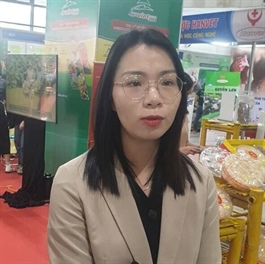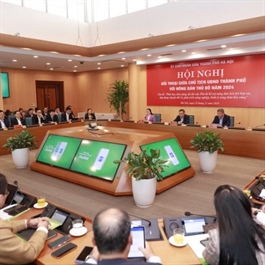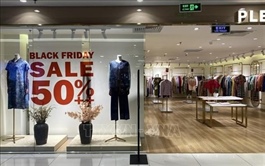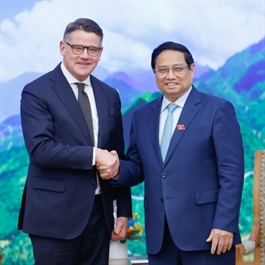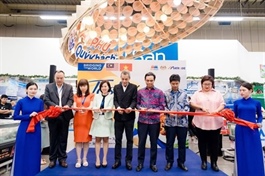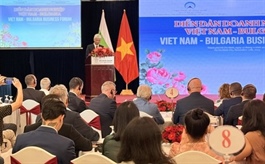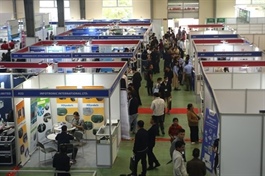Norway expertise helps Vietnam develop marine aquaculture
Norway expertise helps Vietnam develop marine aquaculture
Lessons from Norway made relevant for Vietnam over the past two decades have helped accelerate the transition from traditional marine aquaculture to industrial mariculture and make Vietnamese products more competitive in the global market.
Vietnam’s industrial marine farming has been developing to a level more competitive in the global market and towards sustainable growth thanks to international support, mostly lessons learned from Norway.
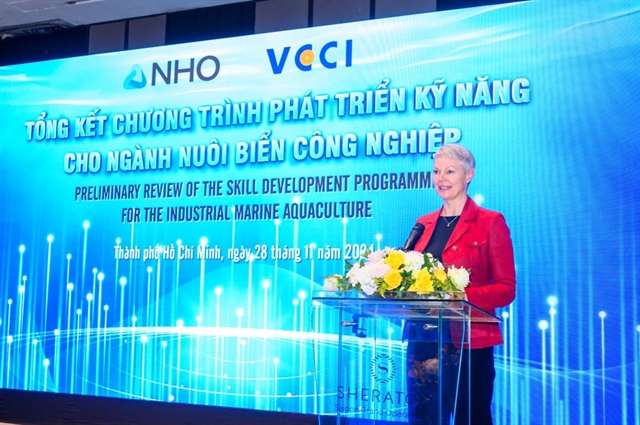
Vo Tan Thanh, Vice President of the Vietnam Chamber of Commerce and Industry (VCCI), speaks at the event on November 28. Photos: VCCI |
The idea was shared by Vo Tan Thanh, Vice President of the Vietnam Chamber of Commerce and Industry (VCCI), at the event to wrap up the skills development program for Vietnam's industrial marine aquaculture.
Thanh highlighted the role of skilled workforce in the transition from traditional marine aquaculture to industrial marine aquaculture, saying it’s not only a demand but also a national strategic challenge.
Vietnam's industrial marine aquaculture is experiencing robust transformation, playing a crucial role in the country's sustainable aquaculture economic development strategy. With the orientation from the "Strategy for Development of Vietnam's Fisheries for the 2021-2030 period, vision to 2045", the Government has emphasized the importance of reducing natural fish farming while promoting industrial marine aquaculture in a modern, safe, effective direction so as to engage more deeply in the global value chain.
Since 2019, with technical support from the Confederation of Norwegian Enterprise (NHO), the Vietnam Chamber of Commerce and Industry - Ho Chi Minh City Branch (VCCI-HCM) has coordinated with the Vietnam Seaculture Association (VSA) to work with experts in marine aquaculture from the provincial Fisheries Sub-departments, aquaculture lecturers, senior managers of enterprises, along with methodological guidance by experts from the Directorate of Vocational and Educational Training (DVET) to develop a set of vocational skills standards and a short-term training program for the industrial marine aquaculture.
“The development of a skilled workforce, along with the cooperation between the government, businesses, and international organizations, is the key to promoting Vietnam's industrial marine aquaculture to achieve sustainable goals and become more competitive in the global market," Vo Tan Thanh said.

Hilde Solbakken, Norwegian Ambassador to Vietnam, delivers a speech at the event. |
Sharing this view, Hilde Solbakken, Norwegian Ambassador to Vietnam, stressed the importance of international cooperation in transferring technology and management experience and NHO and VCCI have cooperated closely since 2004.
She told The Hanoi Times that the curriculum for the marine and aquaculture sector is a very practical and timely result of this cooperation, very much in line with the strategic priorities of both Norway and Vietnam.
“Knowledge sharing between the countries not only creates better results, but it also strengthens our relationship with one another,” she said, stating the project drawing on experiences from the Norwegian marine aquaculture industry. In addition, lessons from Norway have been made relevant for Vietnam with the help of experts from the Directorate of Vocational Education, the Directorate of Fisheries, the Vietnam Seaculture Association, and leading enterprises in the field.
At the event held on November 28 by the VCCI-HCM, the Documents and Short-term Training Program for Industrial Marine Aquaculture were introduced and transferred to related agencies.
Marine aquaculture refers to the breeding, rearing, and harvesting of aquatic plants and animals. It can take place in the ocean, or on land in tanks and ponds.
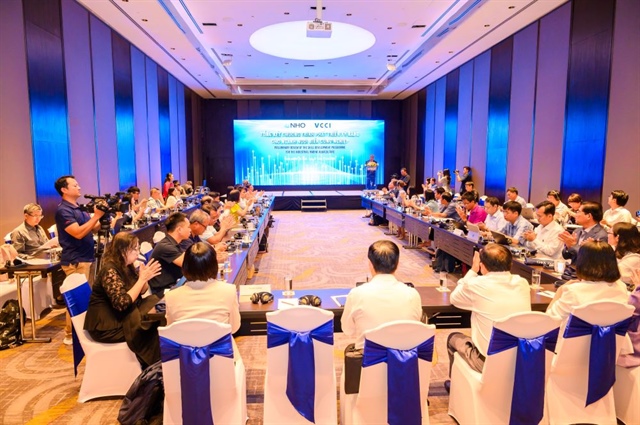
Overview of the meeting on November 28. |
Thanks to the long-term cooperation between VCCI-HCM and NHO, the Vietnam Seaculture Association (VSA), with the active participation of experts in the industry, and lecturers from vocational training institutions, important publications of practical value were developed, such as the set of vocational skills standards, Training programs, and Documents, which include 7 key subject matters that are thoroughly compiled, adhering closely to the reality at industrial marine farms, and integrating international experiences, especially that of Norway.
Nhu Van Can, Deputy Director of the Directorate of Fisheries under the Ministry of Agriculture and Rural Development, said the Directorate of Fisheries highly appreciates the ‘Occupational Skill Standards and Short-term Training Program for the Industrial Marine Aquaculture Profession,’ as well as the training and transfer activities led and developed by VCCI.
In the coming time, the Directorate of Fisheries will collaborate with the Directorate of Vocational Education and Training to standardize these skill standards and cooperate with schools and enterprises to develop and enhance the quality of human resources.
The program not only provides theoretical knowledge but also focuses on practice. The main courses such as (1) Establishment of marine aquaculture facilities; (2) Techniques for operating marine aquaculture facilities; (3) Techniques for raising and harvesting fish at sea, (4) Maintenance and evaluation of industrial marine fish farming facilities are designed with high applicability to immediately meet urgent market requirements.
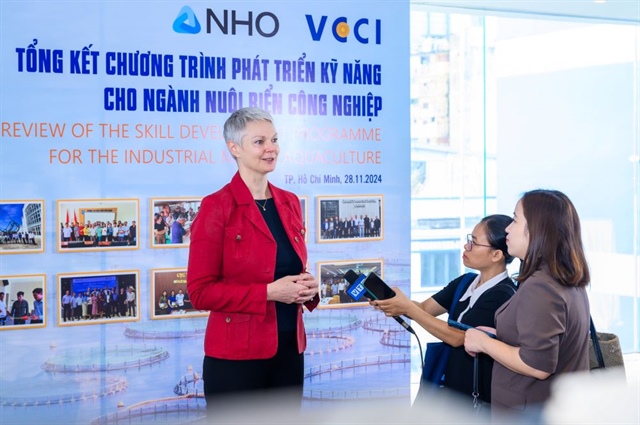
The documents for industrial marine aquaculture compiled by Norwegian and Vietnamese partners. |
Nguyen Thanh Tung, a marine farmer from Kien Giang and a participant in the program, shared with The Hanoi Times that he was only familiar with the traditional way of farming fish using wooden rafts, which was highly dependent on weather. Thanks to this program, he has since learned how to operate high-tech cages and gained a better understanding of disease control and how to optimize the farming process. “This has not only helped me mitigate risks but also increased productivity,” he emphasized.
From a traditional profession associated with the livelihoods of millions of coastal people, industrial marine aquaculture has become a national strategy thanks to multilateral cooperation. The program's success is reflected not only in furnishing skills but also in raising awareness and motivating thousands of workers to adopt sustainable production models.
In a talk with The Hanoi Times, Hoang Ngoc Binh, a representative of Australis Aquaculture Vietnam Limited, the world's largest producer, processor, and exporter of barramundi with an annual output of over 10,000 tons, who is implementing a project in smart aquaculture in the Van Phong Bay area, shared that human resources equipped with good practical skills and high professional qualifications allow businesses to improve productivity and farming quality and protects the marine environment.
Nguyen Quang Viet, Director of the Vietnam VET Accreditation Agency - Directorate of Vocational Education and Training said that the approach of both future-proofing while maintaining close adherence to reality and reference to the international experience of the program is very novel and suitable for the actual characteristics of Vietnam.
Bui Thi Ninh, Deputy Director of VCCI – HCM and lead coordinator of this program, said the skills training program for industrial marine aquaculture is a testament to the effectiveness of the tripartite cooperation model between the state, businesses, and schools.







